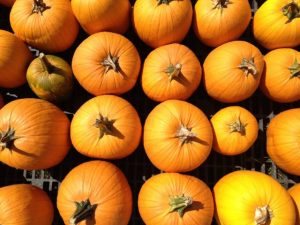Illinois Ag in the Classroom catapulting into new school year
By Kay Shipman FarmWeek — August 23, 2021
Illinois Ag in the Classroom is catapulting students into a new school year with fun activities to celebrate a crop our state is great at growing– pumpkins. (Illinois Farm Bureau Stock Photo)
What student wouldn’t enjoy building a contraption to fling candy pumpkins? Exactly.
That’s why Illinois Ag in the Classroom (IAITC) developed lesson plans to incorporate science, engineering, technology and math (STEM) into a hands-on project that also connects to the state’s pumpkin crop.
“Agriculture is a great way to bring more STEM into the classroom,” said Chris Wyant, IAITC education manager.
Not only does the catapult lesson make science fun, but it also highlights a little-known fact for many teachers and students.
“People don’t realize Illinois is the number one producer of pumpkins,” Wyant noted.
To give students background knowledge about pumpkins in Illinois, IAITC updated its pumpkin Ag Mag educational magazine, which is available from county ag literacy coordinators. Teachers also have access to a variety of lessons and hands-on activities that focus on pumpkins and pumpkin facts.
With candy pumpkins as launching fodder, students build small catapults using popsicle sticks and rubber bands with a plastic bottle cap to hold the candy. As a hypothesis, students are encouraged to estimate the distance their pumpkins will travel. After measuring and testing different angles, students may be challenged to improve their designs and create more powerful catapults.
While the pumpkin catapult is geared for students in fourth through sixth grades, Wyant said his second-grader built a catapult and the youngster’s design launched candy farther than his simpler one. Wyant also designed a larger catapult using polyvinyl chloride, or PVC, pipes and bungee cords. The larger device is suitable for launching mini pumpkins outdoors.
“We’ve intentionally designed lessons that can apply to lower and upper grades,” Wyant said.
And for students who love the wow factor, teachers can demonstrate exothermic chemical reactions using a real pumpkin to create an “exploding” jack-o’-lantern, according to Wyant. A mixture of yeast, hydrogen peroxide and dish soap creates a reaction when oxygen gets trapped in soap bubbles and foam spews from the pumpkin.
With pumpkin harvest ahead, IAITC offers lessons and hands-on pumpkin activities for different elementary grades.
Younger students may learn about a pumpkin’s life cycle from seed to pumpkin by creating a pumpkin chain using paper plates and construction paper.
Students in the third through fifth grades may build three dimensional pumpkins from construction paper strips, each with a different pumpkin fact.
Find all the pumpkin lessons and lists of needed materials online at https://iaitc.co/pumpkins or contact your county ag literacy coordinator.







